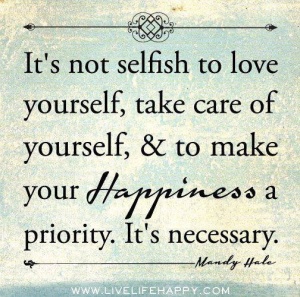Let’s talk about you. How is your heart feeling these days? If you are doing great, never better then I want you to know you may not be in the majority. Some of your deployment sisters are having a hard time and now may be a good time to reach out and check up on those long-lost women you used to chat with on a weekly basis back in the dark days of the deployment. If you are one of those women who finds herself at a loss right now, you are not alone. I doubt I am wrong when I say that every single one of us has dealt with what you are going through to a certain degree at least once since our spouse returned from war.

Your heart may bleed for your soldier but it is still YOUR heart: Yours to take care of and yours to protect.
I’ve written about reintegration and the problems Ty and I have encountered, I’ve also written about his amazing willingness to go to marriage classes and work through some of the “big stuff.” But, honestly, it is an ongoing process. Any military spouse can attest to the fact that frustrations pop up on a regular basis. We learn to pick our battles and see our spouse’s heart despite their actions but what about when the mounting problems seem to be overwhelming?
What about the issues that seem huge to us and yet somehow invisible to them?
What if communicating with your soldier has become a minefield that you’d rather avoid than take head on?
Perhaps the most important thing to remember is that you’re not alone. Like I said before, every single problem that has been reported to me from my fellow spouses is one I have experienced myself or have heard from another SO, desperate for answers. Our sisterhood did not end when their plane touched down on American soil. We remain bonded in our ongoing journey to a new sense of normalcy and the happy medium we hope to find between the marriage we had THEN and the marriage we have NOW.
Second, remember that the man (or woman) you married and the person you kissed goodbye before this long ordeal is still very much with you. Even during periods of hard times, I’m sure you see glimmers of him. He’s in there. He may be different and the differences may be very hard to accept, but your husband is there and he needs your support more than ever.
(Note: If your problems with your soldier turn from communication issues into abuse, or you even suspect you are being abused you need to seek help immediately. Despite your spouse’s good heart, he may need more help than you can give and it is extremely important for your safety and emotional health that you do not remain silent about an abusive situation for ANY period of time. Seek help if you suspect you are being abused.)
Maybe it was a physical trauma or just the displacement that comes with being in a war zone for a year that has affected him or maybe, like so many veterans, he is loosing touch with the things that tie him to this reality and finding himself more and more drawn to the reality he left overseas. No matter what the cause, the effect can be hard on the family emotionally, financially and psychologically. We can find ourselves feeling beaten down, unappreciated and even more responsible for everything than we were when our soldier was gone. You’re not alone and it is very unlikely that your soldier is doing it on purpose. The question becomes, what are you going to do about it?
It is my experience that every person is equipped with a certain toolbox. We gain tools from the families we were raised in and from years of experience with relationships. We bring these toolboxes into our marriages and when problems arise, we reach in and grab the only things we know how to use. Some people are lucky enough to have vast, expansive tool collections of healthy, effective problem solving mechanisms. I am not one of those people. The tools I picked up from my family were mostly good but sometimes not so good and my past relationships were laden with poor communication, resentment, codependency and strife (young love isn’t as great as people make it sound). So when I boldly married a soldier I knew that I probably had no idea how to handle what was about to happen and I was right. Like REALLY right.
I had no idea how to handle the deployment. Did you? These things don’t really come with instruction booklets and a lot of us were lucky to make it through without completely losing our minds. So how in God’s name do we expect to be perfectly suited with the right tools to handle reintegration and post-deployment problem solving? I mean, that’s akin to asking me to install a new roof on my house or build an X-Ray machine. We’ve never done this, you guys. Even those of us who have been through one deployment have never been through TWO. That’s a completely different situation. You’ve never been through THIS deployment, sister. You cannot expect yourself to innately know how to handle it.
So where do we go to gain shiny new tools for uncharted territory? The answer for me has been therapy. I know what you’re thinking … well … I think I know. I think you may be sitting in your chair shaking your head and thinking, “There’s no way I’m going to go to a therapist. I’m not the one with the problems. I’m the same now as when he left.”
You know what? You might be right. You might be the same now as you were then. But we’re not talking about fixing what may or may not be wrong with you. We’re not talking about digging into your emotional past and talking about how your relationship with your great, great grandmother has shaped who you are today … we’re talking about TOOLS and therapists know tools. Trust me.
Think of it this way, we go to the dentist when we need root canals and oral surgery, right? Sure. But we also go when we just need a cleaning. We go when we want to have our teeth whitened so we can impress people at our high school reunions. We go for a multitude of reasons. All you have to do is TELL the dentist what you are there for and he or she will know how to proceed. The same is true for a therapist. Tell him or her what you need and he or she will give you the tools you want.
Some of you may be approaching this as strictly a couple’s issue. You may have inner dialogue that goes something like this:
“Our marriage is falling apart, our communication is dissolving and we fight whenever I try to talk to him. We are in a bad spot and we need counseling.”
This thought may be followed with something like this:
“I know he’ll never go to therapy. He doesn’t even think he has a problem and even if he did admit he has issues, he’s too proud to go. Our marriage may be in real trouble here.”
Let me suggest something to you, ok? You are strong. You made it through a deployment for goodness sake. You fixed appliances, changed the oil, watered the lawn and took care of the kids. You have the ability to take charge and do things on your own. If you need to take charge of your own happiness, you are completely capable of the task. You CAN go by yourself and you absolutely should.
Just because your soldier may be completely opposed to going to therapy doesn’t mean you are. You and your children need tools. If he is unwilling to get help, then you are even more in need of tools. Grab your big girl panties and your car keys and go get those tools, sister!
There are plenty of places to go. The Vet Center in Chico is located at 280 Cohasset Rd. and the phone number is 899-8549. They are there to help you. If you don’t feel like you get the answers you need from them, go online to Military One Source or call them. They do over-the-phone counseling calls for FREE. If military resources are not your preferred avenues, get a hold of a therapist in your area and put your Tri-Care benefits to work! A lot of therapists operate on a sliding scale based on income, too. I guarantee there is a resource out there that will fit your needs. You may have to do some legwork but you are a military spouse! You’ve got this. When we need something we get it and when we want something bad enough we are willing to work for it. Your marriage, the happiness of your family and your own wellbeing are all very worthy causes. You just have to be proactive.
We spend a lot of time thinking about our spouses. As military SOs, we’re trained to put them first, consider their needs and their safety. We memorize the rules of OPSEC, go weeks upon weeks without communication and offer genuine understanding when our needs go unmet. But now is the time to think about you. You need to focus on your own mental health. If things are not going well or if you just need to talk, reach out. Reach out to the women who went through it with you. Reach out to the resources we learned about during those hours at Yellow Ribbon ceremonies or reach out to family and friends for support. But, whatever you do, don’t allow yourself to become isolated. We got through the deployment together; we can get through this, too!



Thank you Elizabeth…just thank you…
Hi Elizabeth! I just checked out your blog and loved this post. Being that you are an army wife, I was hoping you’d be interested in working on something together for an upcoming event relating to military members and cancer. I’d love for your help, could you email me please? Thanks : )
Emily